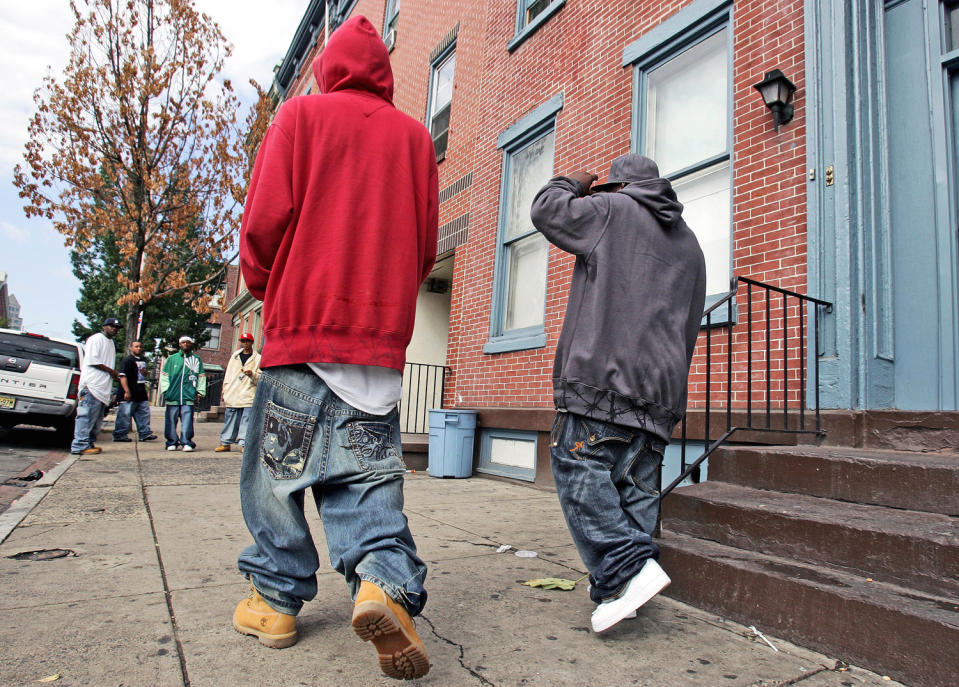States are still trying to pass saggy pants laws. Here's what they're really about.
Wearing saggy pants is less a fashion statement than it is a political one — and yet another state is trying to make it illegal.
South Carolina’s Bill 4957 dictates that anyone caught wearing pants hanging more than three inches below the hipbone and exposing skin is charged with a noncriminal offense. Notably, the bill targets men, not women.
First-time offenders would be charged $25, second-time offenders would pay $50 or fulfill up to three hours of community service, and people caught three or more times would pay $75 and complete up to six hours of community service.
Rep. Wendell Gilliard tells Yahoo Lifestyle he originally co-sponsored the bill, but on Wednesday, he withdrew his name due to priorities related to the Feb. 14 Florida school shooting. However, the bill is still under consideration, and Gilliard would like to see the issue pursued on a local level.
“Pants should be worn at the waist as a matter of decency and respect,” Gilliard tells Yahoo Lifestyle. “This is a fad from the music industry and kids of all races participate.”
Saggy pants are already unlawful in other South Carolina cities, as well as parts of Georgia, Louisiana, Florida, and New Jersey. Plenty of nightclubs and restaurants have banned the style on the grounds of decorum, despite a general backlash that the rule has racial undertones. And in 2013, a McDonald’s franchise owner placed signs that read “No Sagging Allowed in This Restaurant” in several of his Dallas-based restaurants (children under the age of 3 were reportedly exempt).

Hilariously, lawmakers in Pikesville, Tenn., argued that saggy pants impair the ability to walk. According to the ordinance, “there is evidence that indicates that wearing sagging pants is injurious to the health of the wearer, as it causes improper gait.” According to NPR, the mayor even referenced a study (which turned out to be an internet hoax) claiming that men who wear saggy pants suffer from premature ejaculation.
Even former President Barack Obama weighed in on the trend, telling MTV in 2008, “Here’s my attitude: I think passing a law about people wearing sagging pants is a waste of time. We should be focused on creating jobs, improving our schools, getting health care, dealing with the war in Iraq. Any public official who is worrying about sagging pants probably needs to spend some time focusing on real problems out there.”
Obama added, “Having said that, brothers should pull up their pants. You’re walking by your mother, your grandmother, and your underwear is showing. … What’s wrong with that? Come on. There are some issues that we face that you don’t have to pass a law [against], but that doesn’t mean folks can’t have some sense and some respect for other people. And, you know, some people might not want to see your underwear — I’m one of them.”
The motivation behind saggy pants bans has been debated, with many claiming they’re racist or classist.
For example, according to local station SCNow, councilwoman Cheryl Qualls rejected a 2016 saggy pants bill in Timmonsville, S.C., saying, “It will increase racial profiling on some of our children here in Timmonsville and across the country. When one child can afford $50 for a pair of pants that’s designed to show underwear and another child cannot and they are together and the child who cannot afford the $50 designer pants is also dressed identical to his friend, then you’re now taxing the mother of the child who can’t afford it.”
According to Anita Jones Thomas, dean of the College of Applied Behavior Sciences at the University of Indianapolis and a specialist in multicultural psychology, the origins of saggy pants help explain the controversy.
“Around the late 1980s, prisons banned belts due to concerns that inmates would use them to commit suicide,” Thomas tells Yahoo Lifestyle. “It was a response to a mental health crisis that largely affects African-Americans, who disproportionately fill the prison systems.”
At the same time, the laid-back style was adopted by rap artists who turned the look into a fashion trend. “Today, many African-American churches run etiquette programs in which they educate boys on the history of the saggy pants style,” Thomas adds.
But the issue of whether saggy pants laws are unconstitutional isn’t clear-cut. “At face value, the answer is no, but it all depends on how the laws are applied,” Shaundra Young Scott, executive director of the South Carolina chapter of the American Civil Liberties Union, tells Yahoo Lifestyle. “If they’re being used to discriminate against a certain group of people or conduct race-based stops, the answer is yes.”
She adds: “We need to ask, who has the privilege of defining decency? One might argue that the hijab, goth clothing, or certain hairstyles are indecent. There are many ways to interpret ‘fashion bans.’”
Here’s the crux, says Scott: “The majority of people who wear saggy pants are minorities or poor people and banning saggy pants could reinforce discrimination or harassment that they already deal with every day.”
Read more from Yahoo Lifestyle:
Anna Wintour called ‘disrespectful’ for not removing sunglasses in Queen Elizabeth’s presence
Jennifer Lawrence’s revealing gown is a reminder that sexism in Hollywood is real
Hello, Lara Croft! Mattel just unveiled ‘Tomb Raider Barbie’
Follow us on Instagram, Facebook, and Twitter for nonstop inspiration delivered fresh to your feed, every day.
